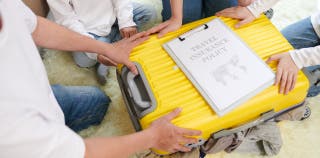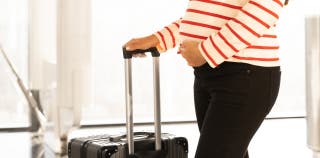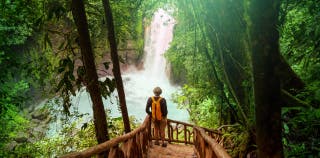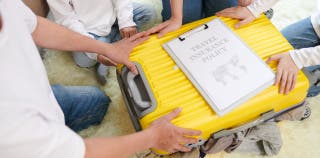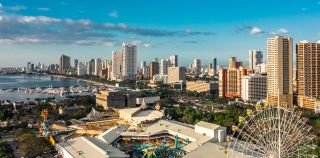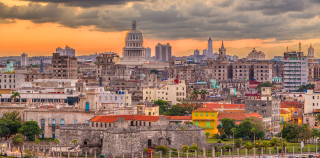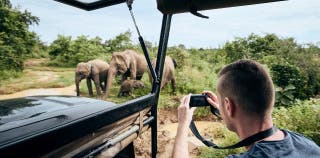- Your U.S. health insurance won’t work in Kenya, so it’s a good idea to purchase travel medical and medical evacuation coverage for your trip even though it’s not required.
- In addition to medical coverage, a comprehensive policy includes coverage for other travel issues, such as trip cancellations, trip interruptions, delays, lost baggage and more.
- Based on our research, our top picks for travel insurance for Kenya come from Tin Leg, Seven Corners and Nationwide (skip ahead to see these plans).
- Travel insurance for Kenya can cost as little as $2 per day for basic medical coverage.
- To compare multiple plans at once and find the best coverage for your needs, try using our online comparison tool.
On This Page
- Key takeaways
- Kenya travel information and requirements
- What to consider when taking a trip to Kenya
- Do I need travel insurance to visit Kenya?
- What does travel insurance for Kenya cover?
- What isn’t covered by travel insurance for Kenya?
- How much does travel insurance for Kenya cost?
- Tips for getting the best Kenya travel insurance
- FAQ: Kenya travel insurance
- Related topics
On This Page
- Key takeaways
- Kenya travel information and requirements
- What to consider when taking a trip to Kenya
- Do I need travel insurance to visit Kenya?
- What does travel insurance for Kenya cover?
- What isn’t covered by travel insurance for Kenya?
- How much does travel insurance for Kenya cost?
- Tips for getting the best Kenya travel insurance
- FAQ: Kenya travel insurance
- Related topics
Travel Insurance for Kenya: Recommendations & Requirements
Our top picks for the best kenya travel insurance
Our top picks for travel insurance for Kenya
Tin Leg
Seven Corners
Nationwide Mutual Insurance Company
Kenya travel information and requirements
| Query | Details |
|---|---|
| Requires tourist visa? | Yes |
| Passport requirements | U.S. passport required; passport must have two blank pages and be valid for at least 6 months beyond your scheduled departure date |
| Local currency | Kenya Shilling (KSh) |
| Language | Swahili, English |
| Average 5-year exchange rate | 1 USD = 115.63 KSh |
| Vaccine requirements | Yellow fever |
| COVID test required? | No |
| Travel advisory level | Level 2 - Exercise Increased Caution |
| Emergency services phone number | 999 |
| Accepts U.S. health insurance? | No |
| Travel insurance required? | Not required, but highly recommended |
What to consider when taking a trip to Kenya
If you’re planning a trip to Kenya, keep the following in mind.
Trips to Kenya are expensive
In 2022, the average trip to Kenya cost more than $11,500 per group, according to data published by SquareMouth. Travel insurance for Kenya can help you recoup some of your costs if something goes wrong during your trip.
For example, if you have to end your trip early due to a covered event, your insurance provider may reimburse your unused prepaid expenses, such as hotel stays and local excursions.
Traveling to Kenya
Not only is international travel expensive, but it also requires careful planning. If you depart from the United States, you may have to stop at Heathrow in London, Charles de Gaulle in Paris or Schiphol in Amsterdam. The more legs you have in your journey, the more likely it is that you’ll encounter at least one delay.
Attractions in Kenya
A trip to Kenya is truly a once-in-a-lifetime experience. You can visit Mombasa, take a safari through the Maasai Mara National Reserve or walk through Amboseli National Park. If you love museums, you may want to travel to Nairobi, Kenya. You can even climb Mount Kenya or visit the Sarara Singing Wells in Laikipia.
Whether you’re feeling adventurous or looking for laid-back activities, many Kenya attractions are in remote locations. Travel insurance for Kenya covers the cost of medical evacuation, ensuring you get the care you need even if you’re far from the nearest medical facility.
Do I need travel insurance to visit Kenya?
You’re not legally required to have travel insurance for a trip to Kenya, but we highly recommend purchasing a policy.
Comprehensive travel insurance protects you in a variety of situations.
Risk of terrorism and political demonstrations
Due to ongoing conflict at the borders of Somalia, South Sudan and Ethiopia, Kenya has a higher-than-average risk of terrorism, kidnapping and political demonstrations. Travel insurance may cover trip cancellations or interruptions due to domestic terrorism or civil unrest.
Bandits and petty crime
Occasionally, bandits cross the Somalia/Kenya border to commit thefts and other petty crimes. These bandits are known as “shifta.” Carjackings and scams are also common. In many cases, Kenya travel insurance covers lost or stolen belongings.
Insect bites, illness and disease
Although the prevalence of malaria in Kenya has declined, it’s still rather common, according to USAID. Kenya is also home to several other insect-borne illnesses, including Rift Valley fever, Dengue, filariasis and African sleeping sickness. If food isn’t cooked and stored correctly, there’s also a risk of contracting hepatitis, measles, cholera and meningococcal diseases.
You can reduce your risk of contracting insect-borne illnesses by using bug spray during your trip. Vaccinations are also available for measles, hepatitis, meningitis and Dengue virus. Due to the risk of contracting these diseases, it’s essential to have medical coverage for your trip to Kenya.
Adventure activities
Some of the most popular attractions in Kenya involve adventure sports and other risky activities. For example, many people board hot-air balloons to watch the wildebeest migrate over Masai Mara.
Standard travel insurance and safari travel insurance policies generally don’t cover these activities, but it’s possible to purchase an adventure add-on for extra protection. Add-ons cover additional risks, making your travel insurance policy even more comprehensive.
Severe weather and natural disasters
Flash flooding, landslides and torrential rains are some of the possible weather-related risks you’ll encounter in Kenya. Your travel insurance provider may reimburse your prepaid costs if you have to cancel or interrupt a trip due to unforeseen risks. For example, if a landslide occurs without warning, you may be able to cancel and get your money back.
What does travel insurance for Kenya cover?
Kenya travel insurance covers a wide range of circumstances.
Let’s take a look at the different types of coverage to help you decide which ones are necessary for your trip.
Travel medical insurance
Imagine you’re looking for elephants at Amboseli National Reserve when you fall and break your femur. U.S. health insurance doesn’t work in Kenya, so you need travel medical insurance to cover the cost of your care. For example, you may need to undergo surgery or stay in the hospital for several days. SquareMouth recommends purchasing at least $100,000 in emergency medical coverage before you travel to Kenya.
Medical evacuation insurance
If you injure yourself while cycling through Hell’s Gate National Park, you can’t exactly have a tour guide drive you a few miles to a hospital. You’ll need to pay for medical evacuation, which is extremely expensive. SquareMouth recommends purchasing at least $250,000 in medical evacuation coverage, but some companies offer up to $1 million in medevac coverage per policy.
Trip cancellation insurance
Trip cancellation insurance allows you to cancel your trip for a covered reason and get reimbursed for your prepaid, nonrefundable expenses.
A covered reason is an unforeseen event that forces you to cancel your trip.
These are some examples:
- Illness
- Injury
- Death of the traveler
- Death of a travel companion
- Death of a non-traveling family member
- Terrorism
- Natural disasters
- Inclement weather (e.g. flash flooding during the rainy season)
Cancel-for-any-reason insurance
Regular cancellation coverage only reimburses you for covered events. If you’re concerned that you’ll have to cancel for another reason, purchase cancel-for-any-reason insurance.
CAFR allows you to cancel your trip for any reason, such as a change in travel plans or fear of kidnapping. Many providers allow you to get back 75% of your prepaid, nonrefundable expenses if you use your CAFR coverage.
Trip interruption insurance
Once you arrive in Kenya, you may encounter a circumstance that forces you to end your trip early. For example, if you contract a foodborne illness, you may be too ill to enjoy all the activities on your itinerary. Trip interruption insurance reimburses the unused portion of your prepaid, nonrefundable expenses.
Assume you spent $700 per night on your hotel and planned to stay in Kenya for seven nights. If you have to end your trip after just two nights, your trip interruption insurance would reimburse you $3,500 ($700 per night for five unused nights).
Trip delay insurance
Unless you live in or around New York City, it’s tough to get a direct flight to Kenya. It’s more likely that you’ll have several layovers, increasing the likelihood of a delay. For example, if one of your flights takes off late, you may miss your connection, throwing off the whole trip.
Trip delay insurance reimburses you for the loss of prepaid expenses caused by delays. It also covers delay-related costs, such as meals, transportation and overnight accommodations. For example, if a long delay causes you to miss your first prepaid excursion, your trip delay insurance should reimburse you for the loss.
Adventure activity coverage
People flock to Diani Beach, just south of Mombasa, to go jet skiing and enjoy other adventure activities. Since standard insurance policies don’t cover these activities, you may need to purchase an add-on.
Baggage insurance
Comprehensive travel insurance also covers lost, stolen, delayed or damaged baggage. For example, if your luggage arrives in Kenya two days after you do, your insurer may reimburse you for the cost of buying new toiletries or purchasing clothing to wear during the first few days of your trip.
What isn’t covered by travel insurance for Kenya?
Kenya travel insurance typically doesn’t cover the following:
- Injuries arising from drug/alcohol use or illicit activities
- Normal pregnancy expenses
- Preexisting medical conditions
- Cancellations/interruptions due to foreseeable events
- Fear of flying/fear of travel
- Named storms
- Medical tourism
How much does travel insurance for Kenya cost?
Travel insurance for a trip to Kenya can cost as little as around $2 per day for basic medical and medevac coverage.
To give you a better idea of how much coverage costs, we got price quotes from some of the top insurance providers. All of our price quotes follow Squaremouth’s guidelines of having at least $100,000 in emergency medical coverage and at least $250,000 in medical evacuation coverage.
The quotes are based on the following criteria:
- Age: 50 years old
- State of residency: California
- Destination: Kenya
- Trip Length: 14 days
- Time of trip: August 2024
- Trip cost: $8,000
For this first example, we got quotes for basic coverage. These travel insurance plans cost around $2 to $5 per day.
Example Where Plan Doesn’t Reimburse the Full Trip Cost
| Provider | Plan Name | Plan Cost | Cancellation / Interruption Limits | Medical / Medevac Limits |
|---|---|---|---|---|
| Tin Leg | Luxury | $40 | $0 / $750 | $100K / $250K |
| Trawick International | Safe Travels Journey | $38 | $0 / $0 | $150K / $500K |
| Seven Corners | Trip Protection Basic | $25 | $0 / $1K | $100K / $250K |
| AXA Assistance USA | Gold | $68 | $0 / $1K | $100K / $500K |
For our next example, our quotes are for comprehensive plans that include trip cancellation and interruption coverage. They range from around $26 to $54 per day.
Example Where Plan Does Reimburse the Full Trip Cost
| Provider | Plan Name | Plan Cost | Cancellation / Interruption Limits | Medical / Medevac Limits |
|---|---|---|---|---|
| Tin Leg | Luxury | $757 | $8K / $12K | $100K / $250K |
| Trawick International | Safe Travels Journey | $418 | $8K / $10K | $150K / $500K |
| Seven Corners | Trip Protection Basic | $429 | $8K / $10K | $100K / $250K |
| AXA Assistance USA | Gold | $359 | $8K / $12K | $100K / $500K |
Keep in mind that the cost of travel insurance varies based on several factors:
- Your age
- The length of the trip
- The total trip cost
- Number of travelers in the group
- Your destination
This means that how much you’ll pay will differ from the quotes displayed above. For accurate pricing, we recommend you try getting a quote.
Tips for getting the best Kenya travel insurance
To get the best travel insurance for Kenya, follow these steps:
Review your transportation options.
If you have to take multiple flights or use some type of public transportation when you arrive in Kenya, you’ll need extra coverage for delays.
Check your itinerary.
There’s no such thing as a risk-free trip, but some activities are riskier than others. If you plan to climb Mount Kenya, go ballooning or participate in other adventure activities, make sure you purchase add-on coverage.
Buy your policy as early as possible.
Travel insurance only covers unforeseen events, which are events that happen unexpectedly. The longer you wait to purchase coverage, the more likely it is that an unforeseen event will turn into a foreseen event, preventing you from recouping your costs. For example, if you buy a policy after a named storm forms, your insurer won’t reimburse you for any losses associated with the storm.
FAQ: Kenya travel insurance
Is it safe to visit Kenya?
It’s generally safe to visit Kenya, but pay close attention to your surroundings and keep your belongings secure. The U.S. State Department recommends avoiding areas of Kenya that are close to the country’s border with Somalia. Some coastal areas of Kenya also have an increased risk of kidnapping.
Do I need travel insurance to visit Kenya?
You’re not required to purchase travel insurance for Kenya, but we highly recommend it. A comprehensive travel insurance policy can save you the heartache of losing your money if you have to cancel or end your trip early.
Does health insurance for Kenya cover travel expenses?
Standard health insurance only covers medical expenses incurred during your trip, but it’s possible to purchase a comprehensive policy that reimburses you for a variety of travel-related expenses.
Can I buy travel insurance after I've started my trip to Kenya?
It depends on the provider. Some companies allow you to purchase insurance after you’ve started your trip, but others don’t. We recommend buying in advance of your trip to get the broadest coverage.
Is medical travel insurance worth it for a trip to Kenya?
Absolutely. U.S. health insurance doesn’t work in Kenya, so you’ll need some way to cover any emergency medical expenses you incur during your trip.




